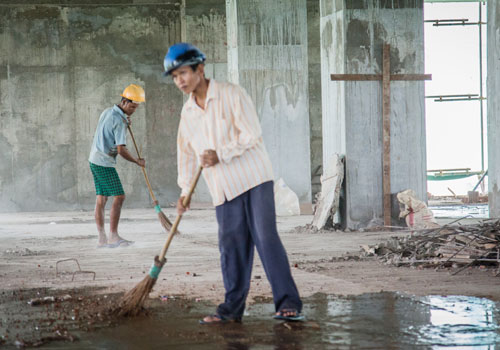 High-rise building developers given the green light to resume construction after a ban imposed by the Yangon Region government in May say the unplanned disruption to their projects has led to significant financial and reputational losses.
High-rise building developers given the green light to resume construction after a ban imposed by the Yangon Region government in May say the unplanned disruption to their projects has led to significant financial and reputational losses.
The freeze on high-rise construction began with an announcement on May 14, which Yangon City Development Committee – an administrative body elected by municipal poll – issued at the request of the Yangon Region government.
That announcement stated that any building project with nine storeys or more that had received a permit under the previous administration would have to stop temporarily for a review.
The government assessment determined there to be 185 projects that had received an in-principle permit from the previous government, many of which had already started laying foundations. The Myanmar Times reported on September 13 that close to one third of these tentatively approved projects have been told by YCDC they will need to make retrospective design modifications if they want to receive a full building permit.
Meanwhile, some 64 additional projects under construction that did receive a full permit from the prior administration were also told to halt for inspections. After a complicated and at times confusing review process, all of these buildings were allowed to continue. Many have since resumed construction, but their developers say they have accrued losses during the period of government review.
Sites had to lay off workers, including hard-to-find specialists, scramble to satisfy lenders who expected steady returns, and placate the owners of the future apartments, who had already started paying for them in advance, developers say.
U Kyaw Kyaw Soe, associate general secretary of the Myanmar Construction Entrepreneurs’ Association and the administrative director of System Engineering, said the stoppage had a huge impact on an already sagging construction market, and damaged customers’ confidence.
“My site has been allowed to resume work after a three-month pause. But I have to start from the beginning. Aside from the financial problems, it’s not easy to bring back skilled workers who were laid off while the site was suspended,” he said.
The most difficult part of the build interruption, he said, was restoring trust among his clients.
“Customers who had bought pre-sale rooms are now unwilling to make further deposits. They’re waiting to see what happens next,” he said.
Developers say the suspension order was a blow to the industry that had hoped a new government would revive the sector after a slowdown in the lead-up to the 2015 election. And the order had deepened industry uncertainty, because parliament has yet to issue by-laws for the long-awaited Condominium Law passed by the previous government.
U Kyaw Kyaw Naing, developer of i-Green company, said his high-rise project had been forced to take out unplanned bank loans in order to restart because pre-paying customers had stopped paying, uncertain the building would be finished.
“Even though we can resume work, we can’t start collecting the money we’re owed immediately,” he said. “People used to trust us, but now we’ve lost that trust, and buyers are saying they will pay us the 40 or 50 percent they owe, but only after construction is complete.”
Wooing back workers laid off as a result of the stoppage was presenting problems industry-wide, said Asia Construction general manager U Yan Aung.
“Everybody involved – entrepreneurs, workers and customers – has been damaged by this. We can’t hand over completed apartments to the buyers on the date agreed, and new contracts have to be drawn up,” he said. But the law is unclear on how to deal with construction-related problems.”
Yet the government is sticking to its guns, saying that the review was needed to ensure a sustainable building sector in the capital.
“If high-rise buildings in other countries do not meet standards the government will knock them down,” said Ye Min Oo, spokesperson for the high-rise inspection team of the Yangon Region Ggovernment.
He said the review was needed and in the case of the 64 projects under construction they had not been asked to make retrospective amendments. But the industry as a whole needed to lift, he added.
“We know the construction market is cooling, but management is also poor,” he said.
Translation by Zar Zar Soe and Khine Thazin Han
Quoted from mmtimes.